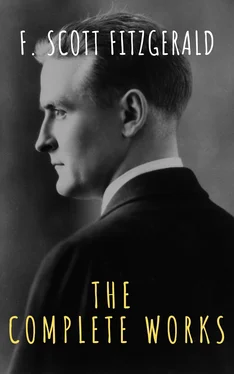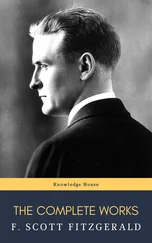Array The griffin classics - The Complete Works of F. Scott Fitzgerald
Здесь есть возможность читать онлайн «Array The griffin classics - The Complete Works of F. Scott Fitzgerald» — ознакомительный отрывок электронной книги совершенно бесплатно, а после прочтения отрывка купить полную версию. В некоторых случаях можно слушать аудио, скачать через торрент в формате fb2 и присутствует краткое содержание. Жанр: unrecognised, на английском языке. Описание произведения, (предисловие) а так же отзывы посетителей доступны на портале библиотеки ЛибКат.
- Название:The Complete Works of F. Scott Fitzgerald
- Автор:
- Жанр:
- Год:неизвестен
- ISBN:нет данных
- Рейтинг книги:5 / 5. Голосов: 1
-
Избранное:Добавить в избранное
- Отзывы:
-
Ваша оценка:
- 100
- 1
- 2
- 3
- 4
- 5
The Complete Works of F. Scott Fitzgerald: краткое содержание, описание и аннотация
Предлагаем к чтению аннотацию, описание, краткое содержание или предисловие (зависит от того, что написал сам автор книги «The Complete Works of F. Scott Fitzgerald»). Если вы не нашли необходимую информацию о книге — напишите в комментариях, мы постараемся отыскать её.
The first table of contents (at the very beginning of the ebook) lists the titles of all novels included in this volume. By clicking on one of those titles you will be redirected to the beginning of that work, where you'll find a new TOC that lists all the chapters and sub-chapters of that specific work.
The Complete Works of F. Scott Fitzgerald — читать онлайн ознакомительный отрывок
Ниже представлен текст книги, разбитый по страницам. Система сохранения места последней прочитанной страницы, позволяет с удобством читать онлайн бесплатно книгу «The Complete Works of F. Scott Fitzgerald», без необходимости каждый раз заново искать на чём Вы остановились. Поставьте закладку, и сможете в любой момент перейти на страницу, на которой закончили чтение.
Интервал:
Закладка:
Jerry found his way to a table situated in the darkest and most obscure corner. Seating himself with a contempt for his surroundings that betokened familiarity rather than superiority he ordered a glass of claret.
The evening had begun. A fat woman at the piano was expelling the last jauntiness from a hackneyed fox-trot, and a lean, dispirited male was assisting her with lean, dispirited notes from a violin. The attention of the patrons was directed at a dancer wearing soiled stockings and done largely in peroxide and rouge who was about to step upon a small platform, meanwhile exchanging pleasantries with a fat, eager person at the table beside her who was trying to capture her hand.
Over in the corner Jerry watched the two by the platform and, as he gazed, the ceiling seemed to fade out, the walls growing into tall buildings and the platform becoming the top of a Fifth Avenue bus on a breezy spring night three years ago. The fat, eager person disappeared, the short skirt of the dancer rolled down and the rouge faded from her cheeks—and he was beside her again in an old delirious ride, with the lights blinking kindly at them from the tall buildings beside and the voices of the street merging into a pleasant somnolent murmur around them.
“Jerry,” said the girl on top of the bus, “I’ve said that when you were gettin’ seventy-five I’d take a chance with you. But, Jerry, I can’t wait forever.”
Jerry watched several street numbers sail by before he answered.
“I don’t know what’s the matter,” he said helplessly, “they won’t raise me. If I can locate a new job——”
“You better hurry, Jerry,” said the girl; “I’m gettin’ sick of just livin’ along. If I can’t get married I got a couple of chances to work in a cabaret—get on the stage maybe.”
“You keep out of that,” said Jerry quickly. “There ain’t no need, if you just wait about another month or two.”
“I can’t wait forever, Jerry,” repeated the girl. “I’m tired of stayin’ poor alone.”
“It won’t be so long,” said Jerry clenching his free hand. “I can make it somewhere, if you’ll just wait.”
But the bus was fading out and the ceiling was taking shape and the murmur of the April streets was fading into the rasping whine of the violin—for that was all three years before and now he was sitting here.
The girl glanced up on the platform and exchanged a metallic impersonal smile with the dispirited violinist, and Jerry shrank farther back in his corner watching her with burning intensity.
“Your hands belong to anybody that wants them now,” he cried silently and bitterly. “I wasn’t man enough to keep you out of that—not man enough, by God, by God!”
But the girl by the door still toyed with the fat man’s clutching fingers as she waited for her time to dance.
V
Sylvester Stockton tossed restlessly upon his bed. The room, big as it was, smothered him, and a breeze drifting in and bearing with it a rift of moon seemed laden only with the cares of the world he would have to face next day.
“They don’t understand,” he thought. “They don’t see, as I do, the underlying misery of the whole damn thing. They’re hollow optimists. They smile because they think they’re always going to be happy.
“Oh, well,” he mused drowsily, “I’ll run up to Rye tomorrow and endure more smiles and more heat. That’s all life is—just smiles and heat, smiles and heat.”
— ◆ —
The Popular Girl.
The Saturday Evening Post (11 & 18 February 1922)
Along about half past ten every Saturday night Yanci Bowman eluded her partner by some graceful subterfuge and from the dancing floor went to a point of vantage overlooking the country-club bar. When she saw her father she would either beckon to him, if he chanced to be looking in her direction, or else she would dispatch a waiter to call attention to her impendent presence. If it were no later than half past ten—that is, if he had had no more than an hour of synthetic gin rickeys—he would get up from his chair and suffer himself to be persuaded into the ballroom.
“Ballroom,” for want of a better word. It was that room, filled by day with wicker furniture, which was always connotated in the phrase “Let’s go in and dance.” It was referred to as “inside” or “downstairs.” It was that nameless chamber wherein occur the principal transactions of all the country clubs in America.
Yanci knew that if she could keep her father there for an hour, talking, watching her dance, or even on rare occasions dancing himself, she could safely release him at the end of that time. In the period that would elapse before midnight ended the dance, he could scarcely become sufficiently stimulated to annoy anyone.
All this entailed considerable exertion on Yanci’s part, and it was less for her father’s sake than for her own that she went through with it. Several rather unpleasant experiences were scattered through this past summer. One night when she had been detained by the impassioned and impossible-to-interrupt speech of a young man from Chicago her father had appeared swaying gently in the ballroom doorway; in his ruddy handsome face two faded blue eyes were squinted half-shut as he tried to focus them on the dancers, and he was obviously preparing to offer himself to the first dowager who caught his eye. He was ludicrously injured when Yanci insisted upon an immediate withdrawal.
After that night Yanci went through her Fabian maneuver to the minute.
Yanci and her father were the handsomest two people in the Middle Western city where they lived. Tom Bowman’s complexion was hearty from twenty years spent in the service of good whisky and bad golf. He kept an office downtown, where he was thought to transact some vague real-estate business; but in point of fact his chief concern in life was the exhibition of a handsome profile and an easy well-bred manner at the country club, where he had spent the greater part of the ten years that had elapsed since his wife’s death.
Yanci was twenty, with a vague die-away manner which was partly the setting for her languid disposition and partly the effect of a visit she had paid to some Eastern relatives at an impressionable age. She was intelligent, in a flitting way, romantic under the moon and unable to decide whether to marry for sentiment or for comfort, the latter of these two abstractions being well enough personified by one of the most ardent among her admirers. Meanwhile she kept house, not without efficiency, for her father, and tried in a placid unruffled tempo to regulate his constant tippling to the sober side of inebriety.
She admired her father. She admired him for his fine appearance and for his charming manner. He had never quite lost the air of having been a popular Bones man at Yale. This charm of his was a standard by which her susceptible temperament unconsciously judged the men she knew. Nevertheless, father and daughter were far from that sentimental family relationship which is a stock plant in fiction, but in life usually exists in the mind of only the older party to it. Yanci Bowman had decided to leave her home by marriage within the year. She was heartily bored.
Scott Kimberly, who saw her for the first time this November evening at the country club, agreed with the lady whose house guest he was that Yanci was an exquisite little beauty. With a sort of conscious sensuality surprising in such a young man—Scott was only twenty-five—he avoided an introduction that he might watch her undisturbed for a fanciful hour, and sip the pleasure or the disillusion of her conversation at the drowsy end of the evening.
“She never got over the disappointment of not meeting the Prince of Wales when he was in this country,” remarked Mrs. Orrin Rogers, following his gaze. “She said so, anyhow; whether she was serious or not I don’t know. I hear that she has her walls simply plastered with pictures of him.”
Читать дальшеИнтервал:
Закладка:
Похожие книги на «The Complete Works of F. Scott Fitzgerald»
Представляем Вашему вниманию похожие книги на «The Complete Works of F. Scott Fitzgerald» списком для выбора. Мы отобрали схожую по названию и смыслу литературу в надежде предоставить читателям больше вариантов отыскать новые, интересные, ещё непрочитанные произведения.
Обсуждение, отзывы о книге «The Complete Works of F. Scott Fitzgerald» и просто собственные мнения читателей. Оставьте ваши комментарии, напишите, что Вы думаете о произведении, его смысле или главных героях. Укажите что конкретно понравилось, а что нет, и почему Вы так считаете.












